The Gorge House: Clovelly
My grandfather built Clovelly for his large family at the height of his considerable prosperity. It was the home of a rich man, a showcase for his success. Despite this, it managed to have the feeling of a real home, where real people lived, and was the unifying focus for all the Woodwards. It was built on the summit of a rocky outcropping near Cook Road and Cloverdale, and could be seen for miles around. The whole of the hill belonged to Granddad. You entered the property through imposing granite gateposts, though there was never actually a gate there.
As you drove up the curving road to the house, you’d hear Danny, Granny’s gentle old dog, begin to bark in welcome. The house had been designed by James MacLure, who had designed many homes of that period. Many of his houses survive, in Victoria and Vancouver, but none could have had more imposing grounds. In spring-time the place was alive with naturalized daffodils and grape hyacinth. There was a tennis court, which had fallen into disuse as the various Woodward offspring tired of the game. There was even a stable in the back of the property, where there lived an elderly brown horse. Connie liked to feed it apples, but I was terrified of its great flapping lips and huge yellow teeth. Nothing could persuade me to have a ride on it as Connie loved to do; it was so tall and intimidating.
There were three separate landscaped garden areas, designed by Auntie Gwladys in the style of Gertrude Jekyll, all free-form ponds and informal masses of perennials. She was helped in the heavier work by Job, the old Chinaman who lived above the garage and did odd jobs around the place. Job was always pleased to see Dad, and especially, Frank, or “Loncie-boy” as he called him. Girls and babies like Chris didn’t count. We loved to play in these gardens, climbing the many Garry Oak trees, or making forbidden fires with the fallen leaves, in which we would “cook” potatoes we’d stolen from the basement. The pools provided endless entertainment, looking for tadpoles, trying to catch goldfish, or just dreaming in the sun, watching jewel-like dragonflies flirter among the water lilies.
Chris’s faithful one-legged lead soldier, Scottie, with kilt and bagpipes, bravely met his end while sailing on a lily-pad one sunny day, and sunk to the bottom without a trace, to Chris’s great distress. At the side of the house there was a large sloping lawn, with a magnificent flowering cherry tree, and a grove of towering pine trees, beneath which two huge boulders met to form a spooky cave. And in this cave, there was, honestly, an enormous fierce grizzly bear, his mouth in a snarl, his claws unfurled, ready to pounce out at you.
The heart of Clovelly was the dining room, a very long narrow room richly paneled in dark woods, dominated by a gleaming long refectory table, upon which stood two ornate silver candelabra and a heavily ornamented silver Epergne. Over the sideboard flew a wondrous stuffed owl, shot I think by Uncle Gerald, a fearsome creature with wings outstretched, talons ready to pounce, cruel beak and fierce topaz eyes. A favourite of all the grandchildren. The other end of the long room held an enormous fireplace of rough-hewn granite, usually with a “roaring fire”, its mantel crowned by one of Auntie Gwladys’ early watercolours of a stormy sea. There were enough cozy chesterfields and over-stuffed chairs for all the family to gather there before or after Sunday supper, with generous window-seats on both sides where us youngsters could listen in on the adult conversation.
Sunday supper for the adults was usually cold roast left over from lunch, with salad and pickles; dessert would be a Lazy Daisy cake warm from the oven, with some of Granny’s bottled cherries or crabapples, preserved with the stems still on them. The children, however, had a very different meal, served in the kitchen, while the main meal was being prepared.
Auntie Phyllis and Lilian would ply us with thick slabs of “bread-on- dripping”, the dripping being the congealed fat from that morning’s roast. If you could eat two “bread-on-drippings” you might be allowed a “bread-on-jam”. This was washed down with mugs of Postum, a drink we all hated.
After supper, Granny and the Aunts washed the dishes with a great clatter, and all the adults rushed off to the Evening Meeting, leaving us children to amuse ourselves in the empty house. We could find lots to do in the kitchen; sampling raisins, currants, and nuts from the built-in storage bins, or cheese from the walk-in larder. Frank once tricked me into taking a large bite of what he swore was a chocolate bar, but turned out to be bitter unsweetened chocolate.
Frank would sometimes disgust us by tying a bread crust to a piece of string and swallowing it, only to pull it out later to observe the process of digestion. I seem to remember him bundling himself into a dumb-waiter and riding down to the cellar, the rest of us pulling on the ropes, but this may have been in the bathroom rather than the kitchen. I know the upstairs bathroom had a laundry-chute which led straight down to the basement; scary! Suppose I was to fall into it by mistake?
If we tired of the kitchen, there was always the study, a sort of storage room by the back door, containing Granny’s old treadle sewing machine, and her antique spinet with its yellowed ivory keys and twanging, out-of-tune sound. This must have been a valuable piece as it had belonged to Granny’s mother or even grandmother. We should never have been allowed to play with it as we did.
In this room there were stacks of jigsaw puzzles, old-fashioned versions of Snakes and Ladders and Happy Families, bound issues of Punch and The Girls’ Own Annual, and a collection of pious Edwardian Sunday School novels, rather lurid stories of an improving nature – “Eric” or “Little by Little” or “Alone in London”. This last was a particularly heart-rending tale which we were sometimes allowed to borrow. Connie and I would take turns reading it in bed, wallowing in the pathos of the little golden-haired child mourning the death of her grandfather. We read it over and over again.
Sometimes we would go to the sunroom and loaf on one of the Malacca chaise longues, in the sweet-smelling humid air of the ferns and flowering plants. If we were lucky we might catch sight of the tiny green tree frog who lived there, in the giant palm tree that pressed against the glass ceiling.
The hall was another favourite room, and it was a full-sized room, despite its name, with its own fireplace and leather-covered lounge chairs. This room was full of family mementos, like Uncle Gerald’s Old-World War 1 flying helmet and goggles, and the brass dinner gong which you might be privileged to ring before supper, if you were very, very good.
There was an intriguing brass tray-table, minutely decorated with strange Arabic writing, and a graceful matching brass jug. Into this room the elegant curved staircase issued, partly muffled by heavy velveteen drapes to minimize drafts.
The drawing room had little to interest us, except maybe the yellowed polar bear rug so soft and friendly, so different from its partner in the dreadful cave outside! This room was little used by the family. It held the piano, and some rather formal chintz covered sofas in lilac tones.
The upstairs of Clovelly held a number of bedrooms, each with its own fireplace. With the exception of Granny’s room, which we avoided, we felt free to rummage through any of these rooms, trying on Auntie Phyllis’ high heeled shoes, hats and dresses, or trying out Auntie Gwladys’ summer bed on her sleeping porch. We sometimes even stole one of Uncle Carman’s cigarettes, and smoked it turn by turn. Sometimes we got up to the attic, and found old flapper dresses belonging to the Aunts. I remember one of apple green, with a dropped waistline, uneven hem, and fringe. On the landing of the back stairs was a little room which Auntie Gwladys used as her studio. It was fun to poke around in her watercolour paints and photographic supplies, but we had to be careful not to leave any sign we’d been in there.
Our family had Sunday supper at Clovelly almost every week, as did the Auntie Beth’s, who lived down at the bottom of the hill, and had a family of goats. Often other families of cousins would be there also, and on these nights sometimes the older girls would organize a game of Ghosts or Sardines, turning off all the lights, and turning the friendly, comfortable house into a house of terror, when at every comer someone (or some thing) might leap out at you from behind some drapery, and when unearthly sounds might be heard.
It was always a relief, on these nights, to hear old Danny start to bark, a signal that the cars were coming up the driveway, and we had to scurry to set the house to rights before the grownups came in.
Next:
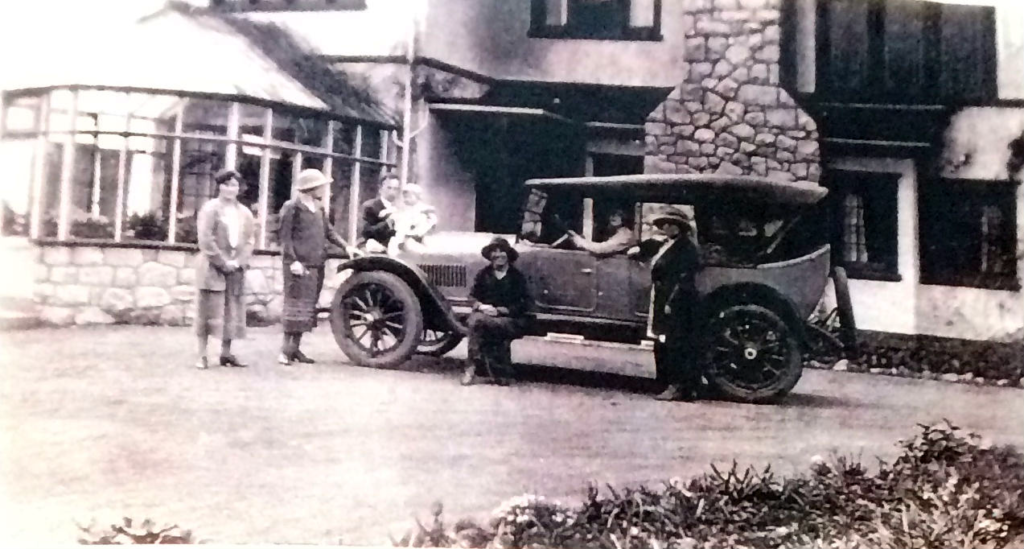
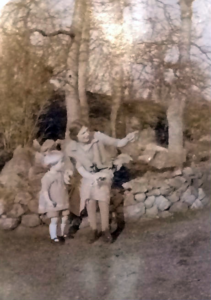

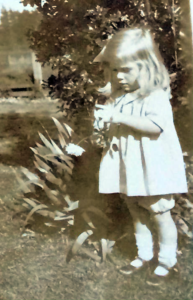
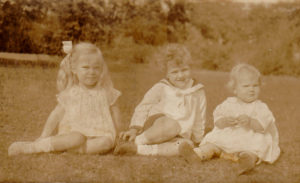
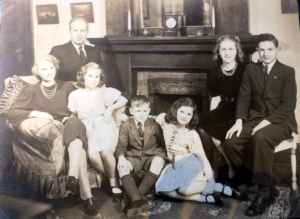
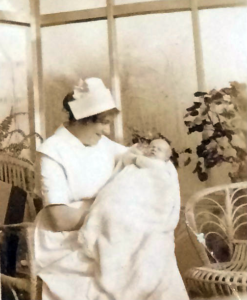
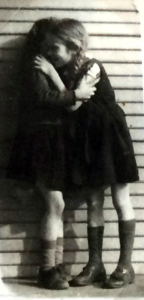
Recent Comments